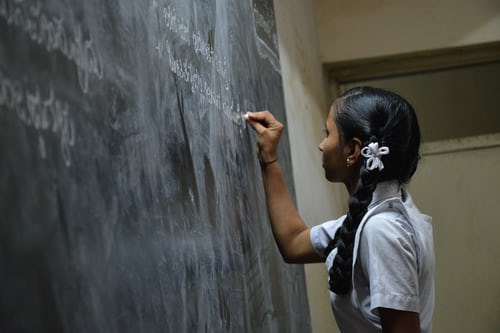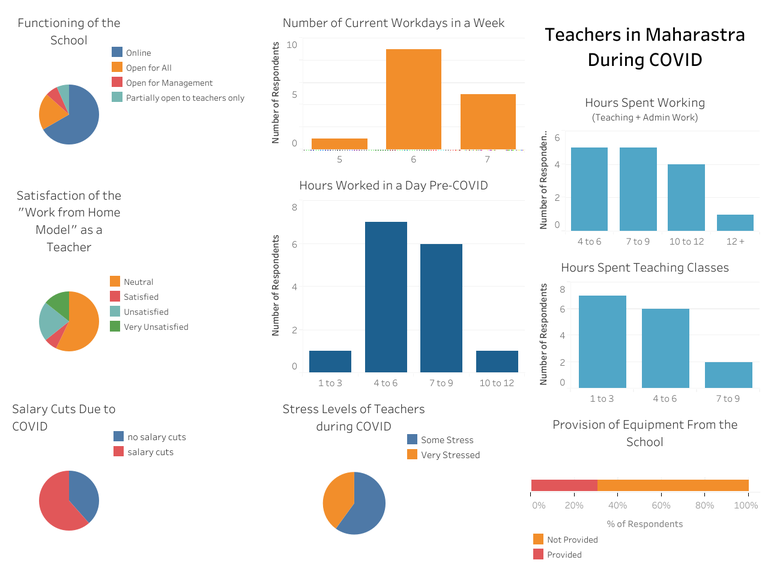Teachers, the backbone of our education sector, have been neglected for far too long
By Dishha Bagchi | Research- Vandita Sanghvi and Anjana Madangarli | Data Visualization- Sravanthi Vempalli
The Covid-19 pandemic has been difficult for people working in most sectors worldwide. Governments imposed strict curbs on movement, forcing employees to shift to the relatively uncharted world of remote functioning.
Teachers worldwide amongst those affected, have twice the burden, ensuring that their students receive a quality education whilst adapting to a changing learning environment. According to UNESCO, approximately 2.7 million teachers were impacted by the Covid-19 lockdown in India. However, teachers have reported not receiving the support they need, facing several challenges in their working conditions, such as increased working hours, salary cuts, physical and mental health issues and more.
We spoke to 20 teachers in private schools across Maharashtra to understand their problems working within the remote teaching model. The identities of our respondents have been kept anonymous to maintain their privacy and safety.

Working conditions before the pandemic
The shift to the online teaching model has massively affected teachers' working conditions. While many respondents believed schools had suitable working conditions before the Covid-19 pandemic, others mentioned facing several issues such as inadequate salaries, lack of a streamlined system leading to last-minute deadlines and more. One of our respondents also mentioned a severe lack of infrastructure, forcing teachers to work in the school corridors. Although our respondents agreed that conditions in schools were better before the Covid-19 pandemic, the existence of such circumstances shows that teachers have been neglected for a long time.
With the emergence of this health crisis, these once-ignored gaps in working conditions became significant challenges in the school's treatment of teachers. The burden of working around these challenges fell onto the teachers' shoulders, who were also adjusting to a new teaching model.
Increase in working hours
One of the most critical issues our respondents faced during the Covid-19 pandemic was a drastic increase in working hours. Teachers who were earlier working for 6 to 8 hours a day are now spending roughly 12 hours teaching online, preparing resources, grading assignments and more. "Our working day is no longer fixed from 7:30am to 2:30pm. Now, we start working right from 5am untill 11pm, correcting papers, attending aimlessly organized meetings, often conducted outside of regular working hours. It's a mess managing our homes while working at these hours," said one of our respondents, teaching in Maharashtra for over a decade. During these gruelling hours, teachers barely get a chance to breathe. "We get negligible breaks between our long hours which is frequently spent talking to students or parents regarding their concerns," said one of our other respondents.

Impact on physical and mental health
Teachers' physical and mental health has been severely affected by this increase in working hours. Many teachers cited an increase in physical ailments such as back and blood pressure issues, migraines and more. Some of our respondents also mentioned facing mental health issues. "Schools have never taken the health of teachers under consideration," said one of our respondents. Even during a health crisis such as the Covid-19 pandemic, schools have continued to ignore teachers' health. Yet, some schools took action to help their teachers. "The school held brief workshops on mental healthcare during our holidays with doctors and mental health professionals. Our school took great initiative on this front. However, with our long working hours and workload, we do not have the time to practice anything to improve our health," said one of our respondents.
The cost of online teaching
Despite working for these additional hours, none of our respondents have received extra compensation from their schools. Instead, over half our respondents faced salary cuts during the pandemic. While some encountered minor salary cuts of 10-15%, other respondents experienced significant reductions of about 70 % for extensive periods.
With the rise of the Covid-19 pandemic, the sudden shift to online classes has not been cheap for most of our respondents; teachers were forced to buy electronic devices such as cameras, laptops, and more. More than 80 % of our respondents stated facing additional expenses due to the remote teaching model. These expenses include buying required equipment, increased electricity and internet bills and more. None of the respondents' schools covered these extra costs. This, coupled with salary cuts, meant teachers also suffered a considerable financial burden due to the Covid-19 pandemic.
Little support, unreasonable requests
Schools have provided little support to their teachers throughout this pandemic. While some received training during this transition to online teaching, others were left to fend for themselves. One of our respondents described an incident where a stranger repeatedly disrupted her online classes. "Since I wasn't familiar with this medium of teaching and did not receive much training, I realized much later that this wasn't a students and was a stranger from outside the school. This experience was quite upsetting. I was pretty scared to enter another online class after that, which in my profession certainly cannot be avoided," said the respondent.
Many of our interviewees faced unreasonable requests from their schools, such as meetings at odd hours, deadlines with hardly a day's notice and much more. One of our respondents was also let go by her school while suffering from a traumatic family loss. All our respondents have indicated being stressed due to work-related reasons, with 60 % being somewhat stressed and 40 % very stressed. Nearly 70 % of them have considered taking an extended break or quitting their job in the past year.
Does this treatment comply with labour laws?
According to the Maharashtra Employees of Private Schools (Conditions of Service) Regulation Act, 1977, a full-time teacher should be present during the school's working hours for a maximum of 30 hours a week. However, teachers currently spend almost 12 hours daily working online, far beyond the mandated working hours. The law also states that the school management should give a permanent employee three months' notice before termination of service or retrenchment. Yet, for many of our respondents and their colleagues, that has not been the case. One of our respondents lost her job during the Covid-19 pandemic while she was on leave, grieving losing a loved one.
When asked if they were aware of their employment rights based on India's labour laws, 40 % of our respondents stated that they were not aware of their rights, 40% being aware of them to a certain degree, and 20% indicated that they were aware of their rights as a teacher. There is a lack of awareness among teachers about their working rights, which also needs to be addressed.
Lack of a collective voice
Although private school teachers across Maharashtra experience similar working conditions, a collective voice needs to bring public attention to their problems. A few teachers' unions, such as the state affiliates of the All India Primary Teachers Federation (AIPTF), have demanded better pay, equal status as frontline workers and other incentives. However, these unions have not highlighted the daily struggles teachers have been facing for the past year. None of our respondents were members of any teachers' union and had very little knowledge about them. "I've never been a part of a teachers' union. I'm not aware of any that exist for private school teachers." said one of our respondents.
Teachers have been the backbone of the education system in India during this pandemic, often prioritising their students over their own needs. However, there has been a lack of support and regulations for teachers working in the private sector during the Covid-19 pandemic. Fair pay, regulated work hours, attention to teachers’ health and access to collective unions are just some of the issues highlighted in our feature.
